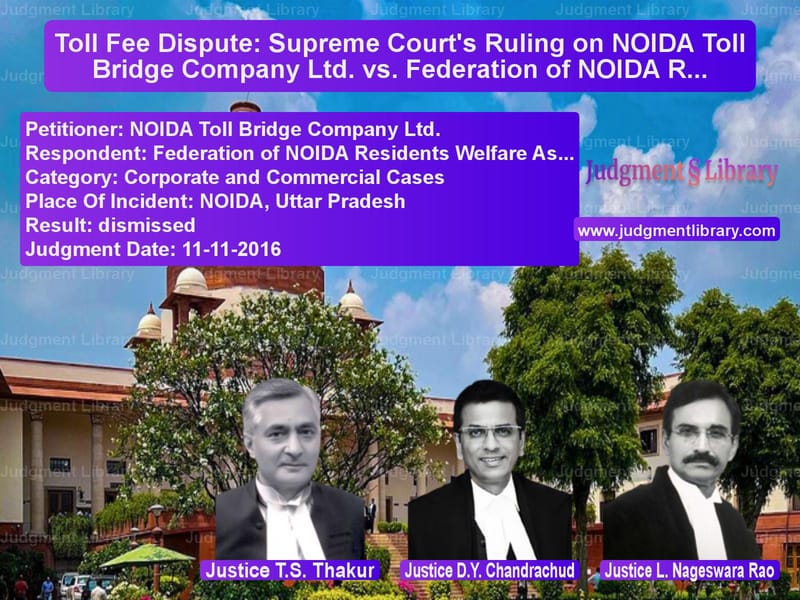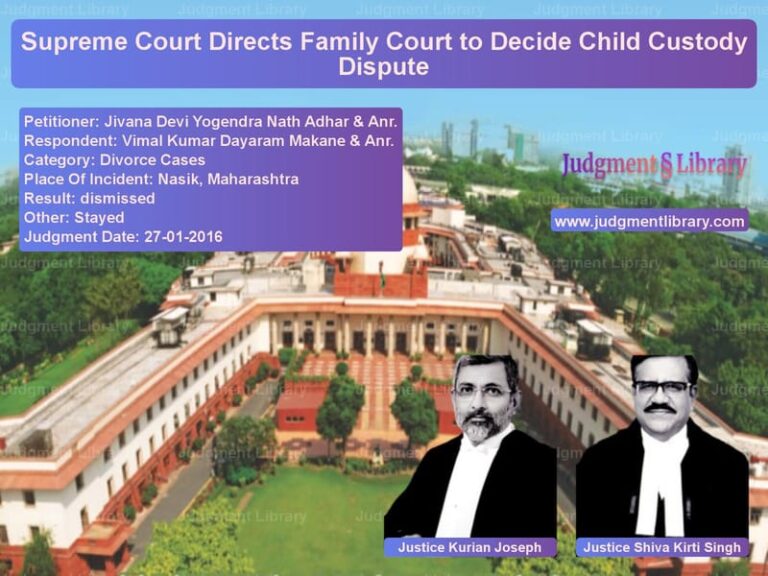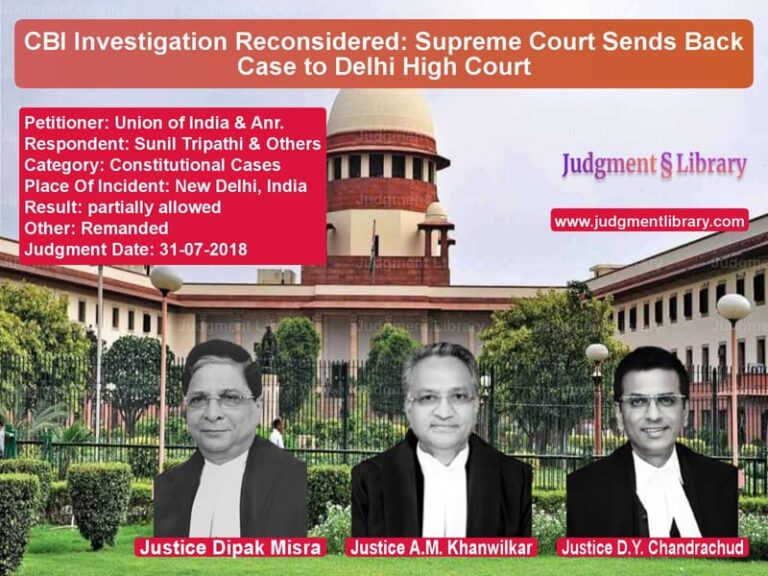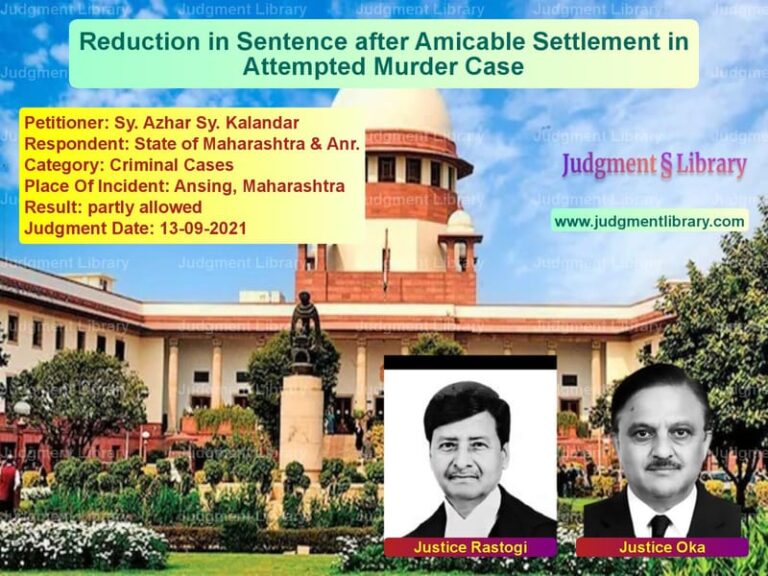Toll Fee Dispute: Supreme Court’s Ruling on NOIDA Toll Bridge Company Ltd. vs. Federation of NOIDA Residents Welfare Association
The Supreme Court of India, in the case of NOIDA Toll Bridge Company Ltd. vs. Federation of NOIDA Residents Welfare Association & Ors., dealt with a significant issue regarding the collection of toll fees on the DND Flyover, New Delhi. The case revolved around whether the toll fee collection was justified under the Build-Operate-Transfer (BOT) agreement, and whether it could be stopped following a public interest litigation (PIL) filed by residents. The Court also addressed the fairness of the agreement and the legality of its terms concerning public policy.
The appellant, NOIDA Toll Bridge Company Ltd., had entered into a concession agreement with the NOIDA Authority and IL&FS Ltd. to develop and operate the DND Flyover on a BOT basis. The project was designed to recover costs through toll fees. The Federation of NOIDA Residents Welfare Association filed a PIL challenging the collection of the toll fees, arguing that the toll was exorbitant and unjustifiable. The PIL led to several legal proceedings, with the High Court directing the cessation of toll fee collection.
Background of the Case
The petitioner, NOIDA Toll Bridge Company Ltd., had developed the DND Flyover and access roads under a concession agreement with the NOIDA Authority. The agreement specified that the project costs would be recovered through toll fees collected from road users. However, residents in NOIDA and neighboring areas, represented by the Federation of NOIDA Residents Welfare Association, contested the toll fee collection, arguing that the recovery period was unreasonable and the toll fees were excessively high.
The main dispute in the PIL filed in the High Court revolved around the recovery of the project costs by the proponent. Respondent No. 1 (Federation of NOIDA Residents Welfare Association) contended that the total cost of the project had already been recovered, and therefore, continued toll collection was unjustifiable. The petitioner argued that the recovery process had not been completed and that the toll fees were necessary for the continuation of the project under the BOT model.
Key Legal Issues
The Supreme Court examined the following key legal issues:
- Whether the toll fee collection was justified under the terms of the concession agreement and whether it was in compliance with the principles of public policy.
- Whether the total cost of the project had been fully recovered, and if so, whether the toll fee collection should be stopped.
- Whether the High Court had erred in directing the cessation of toll fee collection, considering the terms of the agreement and the legal framework.
Petitioner’s Arguments
The petitioner, NOIDA Toll Bridge Company Ltd., argued:
- The concession agreement clearly stipulated that the project costs would be recovered through toll fees over a specified period of time, and that the toll fees were an essential part of the agreement.
- The total cost of the project had not been fully recovered, and the ongoing collection of toll fees was justified under the terms of the agreement.
- The PIL was not maintainable, as the agreement was legally sound and complied with the applicable laws, including the U.P. Industrial Area Development Act, 1976.
- The High Court had overstepped its jurisdiction by directing the cessation of toll fees without properly considering the terms of the agreement and the financial feasibility of the project.
Respondent’s Arguments
The respondent, Federation of NOIDA Residents Welfare Association, argued:
- The toll fees were exorbitant and had already been collected in excess of the cost of the project, as evidenced by reports from the petitioner’s auditor.
- The project had been completed, and the total cost had already been recovered, making the continued collection of toll fees unfair and unjustifiable.
- The terms of the concession agreement were unfair and violated public policy, particularly with regard to the excessive delegation of power to the concessionaire for toll fee collection.
- The public interest required that the toll fees be stopped immediately, as the financial burden on residents was unreasonable.
Supreme Court’s Observations
The Supreme Court critically examined the concession agreement, the financial details of the project, and the claims made by both parties. The Court made the following key observations:
1. The Legality of the Concession Agreement
The Court acknowledged that the concession agreement was entered into legally, and toll fee collection was part of the project’s financial model. However, the Court also observed that the agreement did not specify an upper limit for the collection of toll fees, leading to the potential for abuse.
2. Recovery of the Total Project Cost
The Court considered the figures provided by both parties regarding the recovery of the total project cost. The respondent’s argument that the total cost had already been recovered was supported by the petitioner’s own auditor’s report, which indicated a net profit after several years of toll collection. However, the Court did not find definitive evidence to support the claim that the cost had been fully recovered.
3. Public Interest and the Excessive Delegation of Power
The Court highlighted that the toll fee collection was intended to benefit the public, but excessive tolls could be detrimental to public interest. The Court also found that the delegation of toll fee collection powers to the concessionaire was excessive and required closer scrutiny to ensure that it did not violate public policy.
Final Judgment
The Supreme Court ruled in favor of the respondents, holding that:
- The toll fee collection could be stopped as the total cost of the project had been largely recovered, and continued toll collection would impose an undue financial burden on the public.
- The concession agreement had certain provisions that were found to be excessive and unjustifiable, particularly with regard to toll fee collection.
- The petitioner was directed to stop imposing toll fees on commuters using the DND flyover, as continued toll collection was found to be against the public interest.
Judgment Outcome: Appeal dismissed, toll fee collection stopped.
Don’t miss out on the full details! Download the complete judgment in PDF format below and gain valuable insights instantly!
Download Judgment: NOIDA Toll Bridge Co vs Federation of NOIDA Supreme Court of India Judgment Dated 11-11-2016.pdf
Direct Downlaod Judgment: Direct downlaod this Judgment
See all petitions in Company Law
See all petitions in Mergers and Acquisitions
See all petitions in Corporate Compliance
See all petitions in Judgment by T.S. Thakur
See all petitions in Judgment by Dhananjaya Y Chandrachud
See all petitions in Judgment by L. Nageswara Rao
See all petitions in dismissed
See all petitions in supreme court of India judgments November 2016
See all petitions in 2016 judgments
See all posts in Corporate and Commercial Cases Category
See all allowed petitions in Corporate and Commercial Cases Category
See all Dismissed petitions in Corporate and Commercial Cases Category
See all partially allowed petitions in Corporate and Commercial Cases Category







